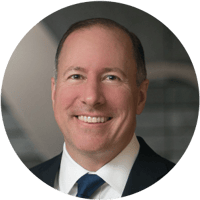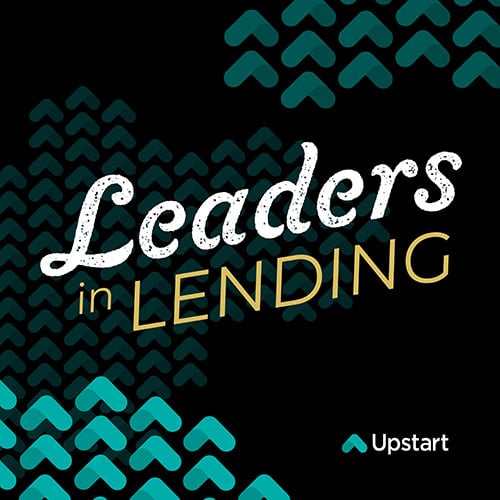Leaders in Lending | Ep. 13
Economic Recovery & Regulatory Changes in Lending
On this episode of Leaders in Lending, we had a fantastic conversation with Rob Nichols, President and CEO at American Bankers Association (ABA) about regulations, economic recovery, and the optimistic future of banking.


GUEST SPEAKER
Rob Nichols
Rob Nichols is the president and CEO of the American Bankers Association, which represents banks of all sizes and charters and is the voice for the nation’s $20 trillion banking industry.
Rob joined ABA in August 2015 following ten years at the helm of the Financial Services Forum, a non-partisan financial and economic policy organization. Before joining the Forum, Rob served in the George W. Bush administration as the assistant secretary for public affairs at the Treasury Department, a position requiring confirmation by the United States Senate. In this role, he acted as chief spokesperson and head of the office of public liaison, serving as Treasury’s lead representative with the media, business, professional trade organizations, consumer groups and the public.
Rob’s earlier career highlights include working as communications director to the late U.S. Senator Slade Gorton and Press Secretary to the late Rep Jennifer Dunn, a former member of the House leadership, and in the West Wing as an aide in the Office of the Chief of Staff in the George H.W. Bush administration.
Rob is a recipient of the Alexander Hamilton Award, the highest honor of the U.S. Department of the Treasury. He also is consistently ranked as one of Washington’s Top Lobbyists by The Hill and was described as one of the “new generation of trade group CEOs” by The Washington Post.
In 2020, Rob was elected to serve a two-year term as chairman of the International Banking Federation, whose members include the national banking trade associations representing every major financial center. As chairman, Rob works with IBFed members to develop international consensus on critical issues, actively engaging with international standard setters and global supervisory bodies on issues that affect banks across borders and around the world.
Rob serves on the Board of Governors of FARE (Food Allergy Research & Education) and is a Corporate Advisory Council member at the Children’s National Hospital.
Rob is a graduate of the George Washington University.

ABOUT
American Bankers Association
American Bankers Association is a banking trade association of community, regional, and money center banks, holding companies, savings associations, trust companies, and savings banks. American Bankers Association provides training and education programs, information products, professional certifications, and technical services to its members. From delivering the latest industry news to developing mission-critical training offerings, they support America's banks as they perform their vital role in energizing the economy and helping communities thrive. The company was founded in 1875 and is headquartered in Washington, District of Columbia.
Key Topics Discussed
-
Potential policy and regulation changes supporting economic recovery
-
The economic landscape and financial health in the near future
-
ABA and their relationship with FinTechs
-
Future trends in banking and lending

“The critical question for banks, in addition to meeting customers where they want to be, is how do you maintain that relationship as you move into more digital channels?”

"If you're a community bank or a midsize bank CEO, it's hard to know exactly where your technology spend should go. That's where the ABA comes in."

“The government realized we need to have the nation's 5,000 banks be the economic first responders for these PPP programs.”
EPISODE RECAP & SUMMARY
This week on Leaders in Lending, we had a fantastic conversation with Rob Nichols, President and CEO at American Bankers Association (ABA) about regulations, economic recovery, and the optimistic future of banking.
Potential policy changes
According to Rob, the ABA has a lot of priorities in alignment with the Biden administration, including increasing access to credit and helping the economic dislocation.
On the regulatory side, there will be some new regulatory leaders — at the OCC and the CFPB — and some will be static. Rob feels confident in the shared goals of helping spur an economic recovery.
“It's in our interest to demonstrate that we want to be part of the recovery story,” Rob said. “Our view right now is the solution and not part of the problem.”
The banking sector can provide value right now on these two fronts especially:
- The housing front. Banks have been working and continue to work with homeowners to keep their homes.
- The small business front. Even before the PPP, banks proactively worked with small business borrowers to keep their businesses afloat.
In terms of working with the government through PPP, Rob called it arguably the most effective part of the CARES Act by a mile — despite the rockiness of its rollout.
Estimates vary, but it probably supported from 50 million to 100 million jobs.
“The government realized we need to have the nation's 5,000 banks be the economic first responders for these programs,” Rob said.
Banks that normally do about $40 million in lending were asked to do $800 billion.
“Of the 5,000 banks in the U.S., roughly 4,000 of them… were the ones dispersing all of that grant money to the small business women in their community,” Rob said.
The economic landscape in the near future
The financial health overall of the average U.S. consumer is improving. According to Rob, the ABA’s economic advisory committee saw that this year’s growth was around 7%, which was positive and encouraging.
One thing that likely contributed was an increase in Bank On-Certified Accounts, which are designed to bring the 7 million unbanked Americans into the banking system. The FDIC reported that the percentage of unbanked Americans is falling, though there are still more who need to build a banking relationship to begin financial security.
From the point of view of banks, there are a couple of key strategic priorities to build and maintain consumer relationships — namely the unity between user experience and financial technology.
Given that banking is a relationship business, it’s important to focus on user experience on mobile digital channels.
The ABA and FinTech
FinTech can help, but there’s no one-size-fits-all for banks.
The biggest 100 banks can usually leverage their own data scientists, but what about the other 4,900?
Rob wants both banks and FinTechs to know that the ABA has a huge team that does due diligence on FinTech companies. In other words, the ABA actively searches out the best FinTech companies to partner with banks.
“We are always on the hunt for ways to improve the banking sector so we're not just surviving, we are thriving. We're meeting customers where they are. We have tons of FinTech companies that we work with to create marriages with banks,” Rob said.
The FinTech marketplace can seem huge and complex even to a larger bank but especially to a smaller one.
In the goal of enhancing the customer experience, the ABA advocates for excellent partnerships between banks and FinTech companies.
Future trends in banking
“We have a huge innovation team that is looking for the future now,” Rob said.
In addition to the continuing evolution of FinTech, there are three other trends in the near future of banking: AI and machine learning, D&I, and climate policy.
- AI and machine learning. AI probably won’t change banking from a regulatory standpoint, but it’s likely to help sort the tens of millions of pieces of financial data that could enhance customer experience.
- Diversity and inclusion. Beyond promoting D&I within banks, the ABA is trying to focus on economic policies that will help address economic inequalities that can contribute to racial inequalities.
- Climate policy. Banks face the challenge of moving toward a lower carbon environment by helping to finance the transition in a way that continues to support economic growth.
Rob’s parting advice
We end every podcast episode with the same three questions. Here’s Rob’s take:
- Best piece of career advice: Treat your interns well. Be humble in helping the junior executives at your workplace.
- Best piece of consumer banking advice: It’s all about trust maintenance with your customer.
- A bold prediction for banking: The introduction of drones into banking is on its way.
Get in touch with Rob on LinkedIn and check out the 2021 ABA conference in Tampa.





